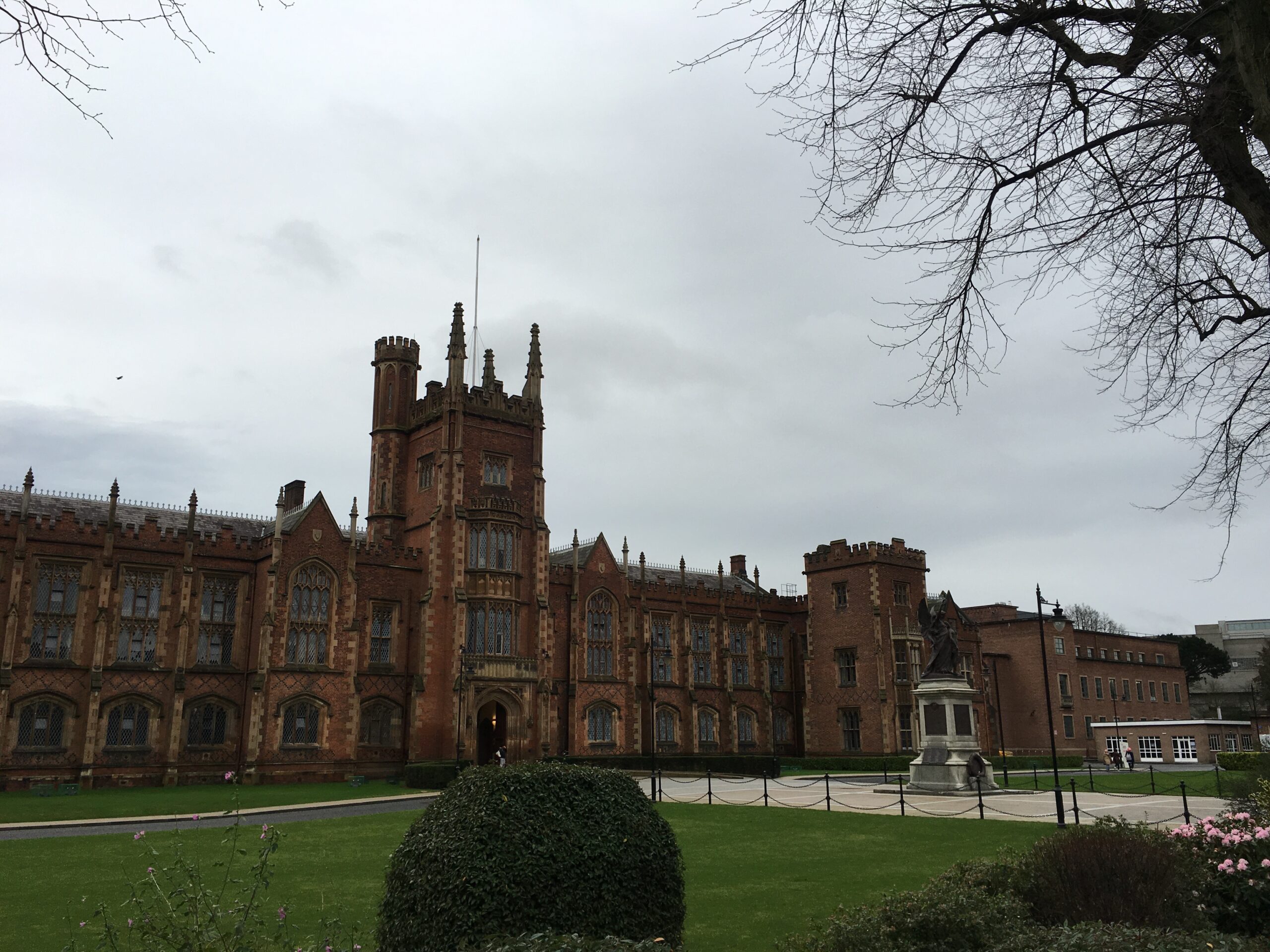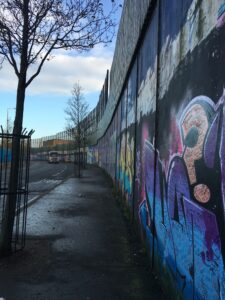Reconnecting with Religion in Northern Ireland


I’d describe myself as a fairly religious person. I’ve been baptized and confirmed, I go to church when I’m home with my family, attend holiday services, and participate in church group activities. However, in my three years at UVM, I have never gone to a church service at school. Sure, I’ve thought about it, but I never follow through and actually make the trek downtown on a Sunday morning.
Going to church while abroad never crossed my mind when I was scouring through travel books and websites, planning for my semester. My lists of things to do included sightseeing in European cities and eating tons of delicious food.
Sure, I’d probably visit a church or two on a tour because Europe has tons of them, but sit in on a sermon? Nah. Little did I know then how large a part religion would play during my study abroad experience, and even after I returned home.
You’re Going There?!

I’ll admit, before I arrived in Northern Ireland, I didn’t do too much research about where I was going. I looked up the weather to figure out what clothes to pack, and analyzed maps to find the nearest grocery store to my residence hall. I couldn’t recall learning much about Northern Ireland in school, so I didn’t know what to expect history-wise. I honestly didn’t realize the Republic of Ireland and Northern Ireland are two separate countries.
I was confused when I told people of my upcoming travels and was met with mixed reactions. In the weeks leading up to my departure, I frantically researched the web and travel books, trying to understand why they made comments about the dangers and religious conflicts in Northern Ireland.
After browsing Wikipedia and a few other refutable websites, I soon became aware of the “Troubles,” the thirty-year conflict between Protestants and Catholics in Northern Ireland.
The streets of Belfast were the battlegrounds of paramilitary gangs, where shootings took place and bombs went off. The Peace Wall was constructed in 1969 to separate the city and remains intact to this day (I signed it!!). Thus began the Troubles, a conflict that didn’t end until 1998.
Aftermath of the “Troubles”
Every guide assured me not to worry though; the people of “Norn Iron” are some of the friendliest you’ll ever meet, and as long as you avoid talking about religion, you’ll be fine. Phew, I thought! Religion hadn’t been on my radar at UVM, so why would it be any different abroad? I’d be fine!
Now, imagine my surprise when one month into the semester, I found myself attending a lunch time event organized by the Christian Students’ Union, listening to a young woman’s testimony about how she found Christianity. Earlier that week, I had attended a pudding party at Crescent Church, down the road from Queen’s University, just one of the weekly events I went to that semester.
Apparently I don’t listen to directions well. I was told not to engage with any religious activities, yet there I was, going to church every Tuesday night to play games, eat food, and share a prayer or two with other students and members of the Belfast community.
Faith, Friends, and Fellowship
Not only was I participating in the activities the local churches and the Queen’s Christian Union put on, I was also frequently discussing religion with my international peers. The last time I talked about religion at UVM was freshman year during my comparative religion class, which I took to fulfill a humanities credit.
In my History, Anthropology, and Politics of Northern Ireland class we were always discussing how religion has been engrained into the identities, histories, and politics of the Northern Irish. It’s a part of daily life there, so I really couldn’t avoid it.
Back home in the U.S., I feel as though religion is sometimes a taboo subject to bring up, so I thought it would be much more taboo abroad, given the violent history between the Protestants and Catholics. Belfast was the last place I’d ever expect myself to engage in conversations about religion on a personal level. I knew I’d be talking about it in relation to the country’s history, but never did I think that I’d be walking down Malone Road on my way back from a church’s ice cream social, sharing my beliefs and questions with friends from around the world.
Comfort Despite Conflict
I’ve never felt comfortable talking about my faith in any other setting besides church before, yet somehow, in a city riddled with religious conflict, talking about it with friends I had only known for a few months felt natural.
In a place where religion has historically divided its communities, I felt as though it drew us international students together. We were able to share our similar church rituals and practices while also learning about each other’s differences.
Religion impacted my time abroad in a way I never expected. My friends and I enjoyed many conversations sharing our experiences with our faith and religious practices, just as frequently as we shared stories about roommates, our studies, and popular TV shows. Though we all came from different walks of life, many of us had religion in common. For some, it served as the foundation for our budding friendships.
I expected that I’d be comparing the similarities and differences between the various cultures I’d come in contact with, but I certainly didn’t anticipate finding religion to be one of the greatest similarities of all.
By engaging with religion both in and out of the classroom, I gained a unique perspective abroad. I studied the implications of the religious conflict in my anthropology, history, and politics course, and then observed them on the streets and with my peers. It was kind of hard to avoid, but unlike at home, I wasn’t trying to avoid it; I was embracing it.
So Now What?
Now that I’ve returned home, I’m continuing to embrace religion. This experience encouraged me to join a church group at UVM. I’ve liked the new Interfaith Center’s Facebook page, and I’ve attended a service led by our campus’ Cooperative Christian Ministry. If this experience has taught me anything, it’s to not avoid things that might be scary or uncomfortable, like talking about religion in a public place, or taking that first step and attending a church service. Taking chances can lead to unexpected friendships, perspectives, and in my case, a new desire to explore my faith.
Lauren P. | Anthropology and Sociology student | University of Vermont | Queen’s University Belfast Partnership in Northern Ireland | 2016